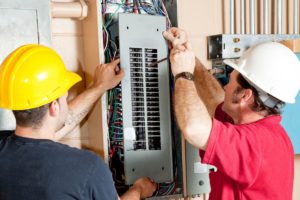Electrical wiring isn’t typically top of mind until something goes wrong. But putting off a necessary upgrade can do more than impact the reliability and functionality of your home’s electrical system; it can also increase your risk for an electrical fire — a leading cause of residential fires in the United States, according to the National Fire Prevention Association.
These are four signs it’s time for an upgrade:
1. Outdated Wiring
If your home was built before 1970, it may feature dated knob-and-tube or aluminum wiring components, which are known safety hazards. If you’re noticing frequently tripped circuit breakers or blown fuses, a persistent burning smell sometimes accompanied by a sizzling sound, and charred or discolored outlets and switches, call us right away. Frayed wires and loose connections can also pose a risk in older homes. If you’re unsure whether your older home’s electrical system has been addressed, it’s a good idea to schedule an inspection.
2. Ungrounded Outlets
Because they don’t include a grounding wire to redirect electrical overloads away from your devices, two-pronged, ungrounded outlets present the risk for both electrocution and power surges — even if you’re using a surge protector. Electrical Codes require that new homes include only grounded/tamper resistant outlets. If you have an older home that is equipped with ungrounded outlets, we can help you to replace them.
3. Missing GFCI Outlets
According to National Electrical Code requirements, ground fault circuit interrupter (GFCI) outlets should be installed in outdoor areas, garages, bathrooms, kitchens, laundry rooms and other spaces with high levels of moisture to protect against electrical shock. You can tell a GFCI outlet from a standard outlet by the “test” and “reset” buttons on its face.
4. Inadequate Power
Older homes were built to accommodate just 30-60 amps using just a few circuits. But most modern homes need at least 100 to 200 amps to operate lights, appliances and technological devices — and adding an air conditioner or hot tub can require an even greater electric load. Whether you’re updating an outdated system or increasing capacity for a home addition or update, you should determine whether an electrical panel upgrade is required.
TIP: If you’re remodeling your kitchen or bathrooms, it’s wise to perform an electrical upgrade first. This will save you from having to cut open newly painted walls or remove your new cabinets to access wiring.
Our licensed electricians on staff are here and ready to take care of all of your residential electrical needs. We pride ourselves on being fast, friendly, and knowledgeable in all facets of your home improvement process. Whether your project is small or large, you’ll get the same level of high-quality work always.
Give us a call at (860) 314-1518 to learn more today!







